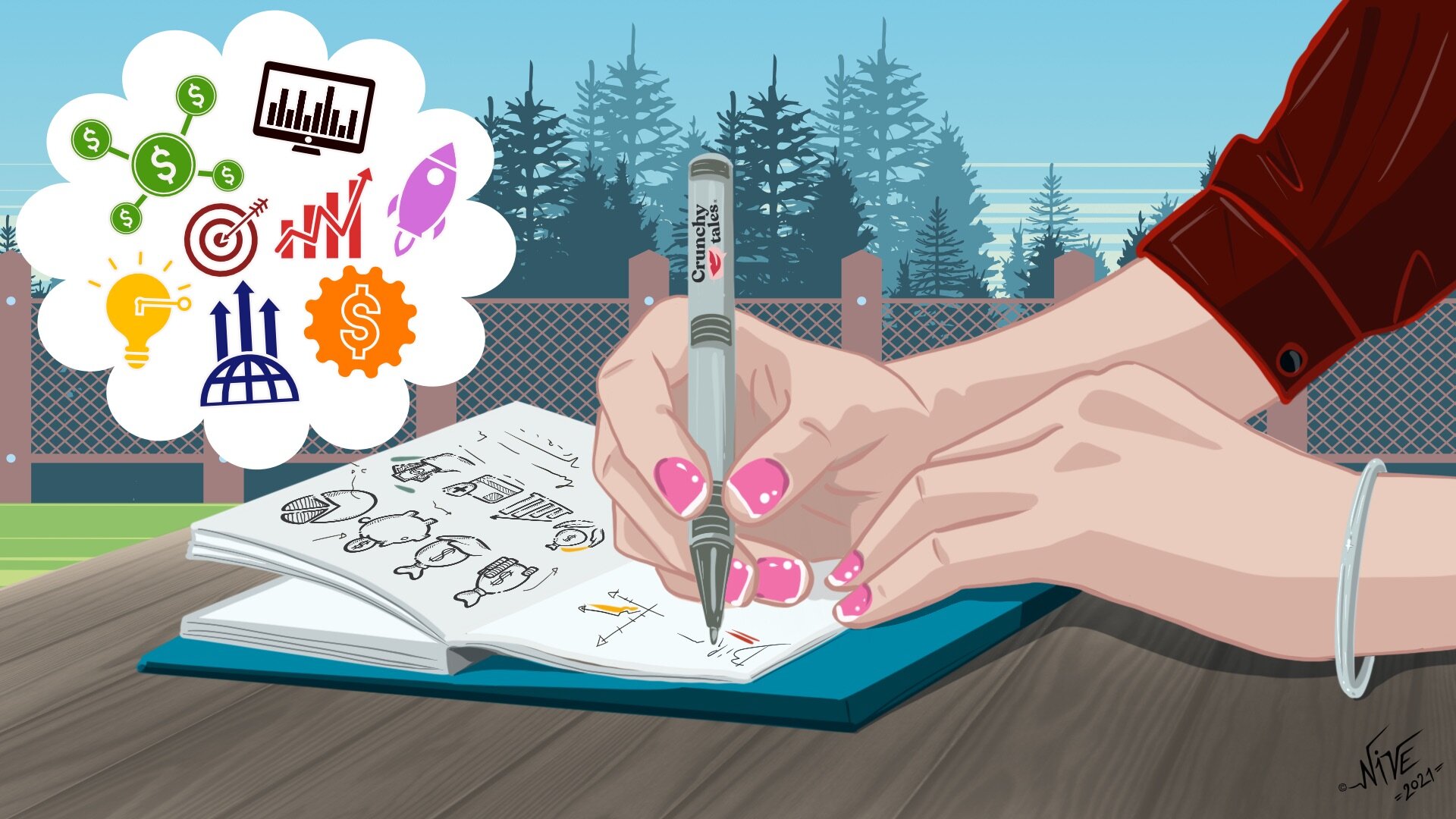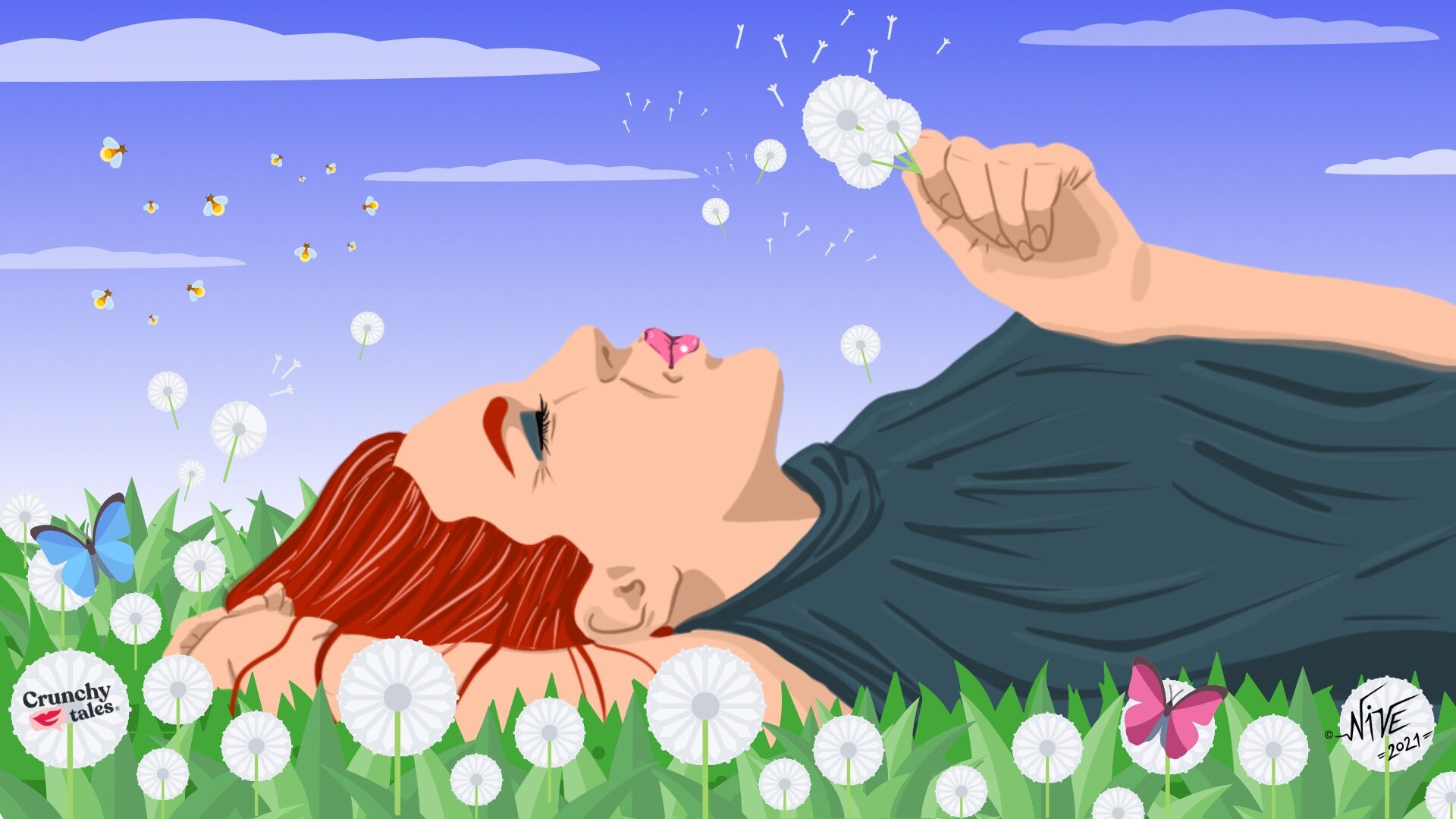Age playfully
We wanted to create a virtual playground where women can find inspiration to think about midlife as a time of renaissance, rather than a time of winding down
Michela Di Carlo, founder of Crunchytales.com, the first illustrated magazine for women over 40 (and counting)
The first time I arrived in Amalfi, it felt like finding the most unexpected gift. It must have been the beginning of summer, as the city was not flooded with tourists. I reached the coast riding a bus that sped down the highway. Every now and then I lifted the eyes from the book I was reading, there was a glorious light outside the window. A friend of mine had a house in Ravello, a little, mysterious town in the mountains of the inland, a place destined to stay on my map forever. We used to have breakfast in his garden, overlooking the gradient of colors down below: the green terrace crops on the mountain side, the ocra rocks that dove into the blue sea dotted with white boats. Every morning, we walked down the hill to reach Amalfi and its beaches. Free from the tyranny of time, we strolled lazily under a canopy of century old lemon trees along the same mule track travelled by Wagner and a long list of notable others who couldn’t resist the charm of the town on the mountain crest. Immersed in the fragrance of rosemary, we admired caper plants growing spontaneously amongst the rocks, we uncovered an old graveyard hidden deep inside a natural cave in the mountain side, and breathed the marine air on its magnificent door step. While proceeding one in front of the other along the last steps that took us to Amalfi, we filled the air with chatter. An old lady sitting on a chair outside her doorstep spotted me as I turned the corner and she promptly announced my passing to someone inside: “There’s a forester.”
From morning to night, Amalfi and the cost up to Ravello was our playground. We laid our towels on the pebbles of the beach, we swam around the rocks to reach a den under the coastal road. We sat in the shady interior looking at the waves washing on the pebbles with a rhythmical, hollow sound. The pebbles, in turn, became shiny and opaque. We strolled through a country fair, buying paper cones of fried seafood to pick with the fingers on the go, we walked under poorly lit stone arches and run on flights of steps, we ate in tiny courtyards with a fig tree in the center and vases of red geraniums on the steps. Despite the breathtaking views of the villas in Ravello, my favorite spot was in the heart of Amalfi. Next door to its cathedral - its asymmetrical facade of black and white stones nestled between the houses -, there’s a tiny pastry shop. On the outside, etched in stone between the two windows, an inscription reads: “House founded in 1830 - Colonial confectionery - jams.” I suppose the inscription dates back to some one hundred years later its foundation, when Italy pursued its imperial dream. The shop is a treasure trove of delights. My friend places the order in the local dialect and then, as rascals, we enjoy our sweet snack sitting on the left hand side of the cathedral’s long, steep stairway that rolls down like a waterfall to the city’s toy-size square.
That afternoon, a newly wed couple and their guests descend the steps. From our lateral vantage point, we can spot men’s trousers with creases and women’s legs in neutral stockings. Following the couple, the father of the bride carries a birdcage with two white doves inside. With sugary hands we reach out for the last “lobster tail,” a triangular puff pastry covered with powdered sugar and filled with a thin layer of pâte à choux and overflowing with light vanilla custard While we bite into the crisp pastry and the soft choux, each of the newlyweds holds one dove in their hands and then, in unison, they release the birds launching them into the air above their heads.The overwhelming flavor of vanilla invades our mouths and we would close our eyes in delight if the birds, in the commotion of their release, didn’t collide in mid air. The guests gasp at this omen and my friend, holding his pastry with one hand, elbows me and chuckles while retelling the whole scene. That whirlwind of events and sensations opens the door to the infinite possibilities we rarely think of. That’s why I particularly like Michela’s story. Michela Di Carlo is an Italian journalist and the founder of Crunchytales.com, a magazine for women over forty and beyond. In the editorial industry, where we are used to thinking that the history has already been written, Michela and her colleagues show a fresh take on the overlooked topic of ageing.
Tell us a bit about yourself and your career, what brought you to Manchester?
I'm a lifestyle journalist with over thirty years of experience and a Master’s degree in Communication Studies from the University of Rome. After having spent several years writing for La Repubblica, the most influential Italian national newspaper and other media outlets, I received an offer from ITV as a content producer in Manchester. I was 45 and I was ready to take on new challenges. Living and working in England introduced me to a world where the terms diversity and inclusion are not just buzzwords and new ideas are always welcome.
How would you define Crunchytales?
It's the first-ever solely illustrated lifestyle magazine (there’s a small gallery at the bottom of the page) for women over 40 and beyond who prefer ageing playfully rather than gracefully. A virtual playground, a break from the usual routine, a space where women can feed their minds and find new inspirations, while enjoying a colourful gallery. We want to redefine the way people think and experience midlife in a more positive way with the help of punchy content and bold illustrations. Our news and features are specially tailored for the late bloomers; women who are evolving rather than disappearing, those who are open to change, and confident to start a positive revolution at any age. You know, Crunchy means crispy, something that makes a sharp noise. We want to encourage women in their middle age to speak up and say it loud: “We are not over the hill!”
What was the a-ha moment that sparked the idea of Crunchytales?
Approaching my fifties, I was quite annoyed by the way society and media portray middle-aged women. Also, I couldn’t find any magazines really able to represent me and my ageless friends. Unfortunately, there is still an aura of frumpiness around the concept of middle-age, and a lot of stereotypes to challenge. So, I thought it was the right time to set up my own magazine. I teamed up with some very talented artists, journalists, and experts who I had the chance to meet along my career and CrunchyTales.com was born.
The illustrations of CrunchyTales are a notable element of the magazine’s identity. Apart from a matter of cost, why did you choose to go this way instead of using regular pictures?
CrunchyTales’ illustrations come from different artists, professionals over 40 who have been succeeded by others, over the years. Each artist has expressed their own vision of middle-aged women. At times playful, witty or sophisticated. They all have embraced this project as a mission: redefining the old fashion idea around the concept of middle age. Recently, Veronica Niccolai has joined us as the new art-director injecting a bit of glamour to our look and feel.
I think illustrations are capable of highlighting the playful and glamorous side of midlife more than pictures. A way to break free from the stereotypical idea of what women of a certain age are supposed to look like. You see, more than just illustrating a topic, we aim to create an atmosphere, inspiring women to think about midlife as a time of renaissance, rather than a time of winding down. Through our illustrations, we want to enhance our content but also show our readers that there is always another side of reality in disguise. We encourage women to develop their sixth sense — what better moment than midlife is there?
Why does it take an independent publisher to fill in the gap in the market with a publication for the Over 40?
That's a very interesting question. In my opinion, big publishers are in some ways dependent on the pressure of groups and lobbies. If they think the mass market is not ready to welcome the change (or advertisers are not ready to invest in a new consumer trend), they probably won't take the risk and may not see the potential of a new movement. On the other hand, small publishers, especially those ones who decide to go online, are free to dictate their own agenda, even though that means sometimes dealing with a tighter budget. In some ways we are closer to our community of fans and followers, so we’re able to better understand what really matters to them. However, I think the tide is changing now and more brands are realising how important it is to invest into this target group. Consumers over 40 are wealthier, healthier, and will live longer than any other age group in history. Today's fifty is not our parents’ fifty and it's time for us, media people, to find a way to reach these very interesting niches.
What level of interest are advertisers showing?
Very positive. We mostly work with small producers, brands that we believe can genuinely make a difference to the lifestyle of our readers. Most of them want to reach their potential clients in a different way and found in CrunchyTales.com the perfect partner. They are aware of the fact that this particular target is very heterogeneous and difficult to “bluff” as it is more experienced. I take pride in saying that our refreshing narrative inspires a dialogue capable of breaking those invisible boundaries between the assumptions and reality about what midlife is supposed to be.
What do you think of the current representation of middle age women on mainstream media?
I might sound too optimistic here, but something is changing. They’ve probably all realised that positive mature female role models in the media can help women become more ambitious and assertive (and that, of course, would invite them to buy more.) Yes, there are more women over 40 on screens and the rise of mature models is growing, but many female characters have still unrealistic bodies and behaviours. I think people now would probably like to see women who they can relate to. However – at the risk of sounding a little controversial — we can't expect all media representations to reflect the reality. Media wants to sell you a dream and a dream doesn't include flaws.
How about the older group of women?
That's a bit more challenging. Older women continue to be depicted as caricatures informed by ageist ideologies. Too frequently we see the portrayals of stubborn, eccentric, frail or grumpy women, dressed most often in heavy, frumpy styleless clothes. Typically, she's a mother or grandmother who either lives with the family or lives alone. If she has a love interest in her life it's portrayed as a silly relationship (but there are a lot of studies supporting the idea that mature people are are more into sex than others.) I wonder what Hillary Clinton, Angela Merkel or Christine Lagarde would think about that… Aren't they women over 50?
Who are the people who influenced your perspective on aging the most?
I don't have a particular “shero” in mind. However, I believe we don't need to go so far to find new inspirations; we can meet cool, modern women everywhere. Although I think there are more of these smart women around the world, living in Europe I’ve mainly been exposed to Spanish, French and Italian women. They are the ones who have inspired me and influenced my perspective on ageing the most. Witty, confident and flirtatious at any age, they enjoy going out, learning new things, having fun at the age of 60 as well as the age of 30. Most of all, their approach to life tends to be more laid-back and that encourages a positive attitude to midlife and beyond. Yes, time is ticking but I believe our soul doesn’t grow old. In my opinion, in order to nurture our inner child, we constantly need to search for the beauty in and around us.
If you had a magic wand, what are the major stereotypes about aging you would get rid of?
Well, I don't understand why we should all be considered menopausal by default (there are a lot of women in their fifties who are still dealing with pads.) Most of all, I don't like this association. It's another label that can only reinforce ageism and stereotypes. Also, it's ridiculous that many people still suppose we spend most of our time baking, playing golf, reading romantic fiction, and wearing cardigans. We are not desperate housewives. Some of us enjoy riding motorbikes, others love travelling the world on their own, going to a rock concert (before COVID stopped them), or even investing in a startup. And no, we are not obsessed with staying young at all costs.
How has your perspective on aging evolved because of your work with Crunchytales?
Interviewing and featuring several women in their prime, I've realised this is really the time of our life. Most of them have challenged themselves with new sports or hobbies, they had the courage to change careers, country, and even husbands! Most of all, midlife is not for retirement. It's the time in which we expand our circle of friends; there is a huge network of mature women out there who support and encourage each other. A kind of sisterhood-league that adds joy to our years.
What do you envision for the future of Crunchytales?
Before COVID put our plans on hold, we were creating more buzz around the whole concept of growing older playfully, celebrating women in all their midlife glory with several events around the UK. With the help of inspirational panellists from different backgrounds, we started to share significant stories of reinvention, motivating other women to approach midlife with a positive attitude. Our first talks had a great response, and we continued from there. Our panel discussions were regularly held in Chester, Liverpool, Manchester and London, five or six times a year. We are now planning to become more international and at the moment we are exploring new locations. We are going to be branching out into Italy.
By Veronica Niccolai - CrunchyTales Copyrights




